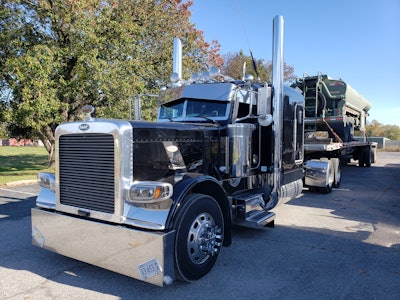The COVID-19 pandemic has been an especially confounding event for independent truckers. I had a conversation yesterday with TBS Factoring Service President Jennifer Lickteig. Asked for her thoughts on the position of her owner-op and small fleet clients through it all, she invoked the sort of rock and a hard place situation Daniel and Phyllis Snow and so many others have voiced.
Lickteig said she’s become “much more concerned with the general health” of trucking. Rates she’s seeing on clients’ factored invoices in many instances are troubling, she added, and troubling “on a number of levels.” They’re “nowhere near sustainable” for independent owner-operators. “I worry about the burden these drivers might feel — public sentiment is as high as its been in a long time” for the work truckers do, and “now some might feel like they have to take these rates. And some of these men and women, this is exactly what they’ll do, and we’re not doing enough to take care of them” as an industry.
Lickteig noted she might actually be in favor of lobbying “to establish a floor” in rates.
She’s not the only one pondering the potential need to evaluate regulation-free pricing in trucking, as the pandemic has laid bare the extent to which rates could quickly plummet in extreme, albeit rare, times.
It’s a model with an old history in trucking (outside of agricultural commodities), that in practice brought with it positives and negatives for independents over time. For the likely few unfamiliar, the Interstate Commerce Commission set rates for most non-ag commodities in coordination with regional rate bureaus until the Motor Carrier Act of 1980 opened everything up to more price competition. Predictably, that sent rates down over a short time, but new abilities to relatively easily obtain carrier authority opened up new opportunities for the independents and would-be independents of the day to compete. (If you missed Episode 3 of the Over the Road podcast series, take a listen for a window onto that history in the player at the bottom of the post).
Among demonstrators in Washington, D.C., starting last Friday, was five-truck fleet owner-operator Rick Santiago, who hauls personally in a 2015 Cascadia with a home base in New Jersey. Three trucks in the fleet haul direct for a customer but for two others Santiago notes he relies on connecting with brokers on load boards, where the pressures over the last month and more left him feeling personally the dynamic that Lickteig describes. “It was alarming to me to see rates that had been at $3 per mile go to just a buck a mile” in some cases, he said, all the while “during this pandemic we’ve been called ‘essential workers.’ Why are we getting paid pennies on the dollar? I can’t tell you how disgusted I am with what’s happening.”
Santiago added that he’s “in favor of there being a cap” on the percentage of a truckload “that a broker can take.”
Anecdotes abound of this and other falling-demand situations (though there was a little glimmer of an uptick today in the weekly spot market report) resulting in well-higher-than-average margins for brokers. Darrell Muller, quoted in Overdrive‘s report from yesterday about the weekend rallies, told me the story yesterday of a couple of partials he was able to find to get him back closer to his Ashland, Va., home base after the coronavirus’ spread began to make access to hot meals and more out West, where he’d been running, more difficult.
 Owner-operator Darrell Muller with his wife and business partner, Renae
Owner-operator Darrell Muller with his wife and business partner, RenaeHe’d loaded a forklift with another partial on his flatbed bound for a receiver in Kansas, “about two hours south of Omaha,” he said. He tried to negotiate the load up from what the broker was offering, receiving the familiar “that’s all I’ve got in it” and ultimately agreeing to the offered price of $900, coming out of Las Vegas.
Once he got there, though, the receiver didn’t have a dock at the load location. Muller describes him as “the nicest guy you could ever want to talk to, young, and you could tell he was doing pretty good for himself.” The broker had made the mistake of booking the wrong kind of truck for the job, though according tothe receiver, that broker had in fact been told a roll-off/roll-back would be needed.
A dispute arose over who would pay for the roll-back that would now be required to unload the truck. “You’re the one making all the money,” the receiver told Muller. And how’d he figure that?
The receiver had paid $2,000 for the transportation of the forklift. “I never said a word to that broker,” Muller said. “I just made a mental note — we’ve got a pad out there in the truck with brokers’ names on it.” Others among you will recognize the good ol’ Do Not Haul list. “He was definitely added to that list.”
 Darrell Muller spent much of Saturday and Sunday parked on Constitution Ave. with other truckers. He runs in this 2013 Peterbilt 389 with a long stretched frame that allows the pair the ability to haul 60-foot beams on their flatbed and mostly avoid the cost of oversize permits, and “still get the oversize rates,” with minimal flagging, Darrell said. In short, they’ve carved their niche as a way through the downturn here working mostly with what he says is a good broker in Material Logistics Management. At once, Darrell said that load availability is such that it’s gotten to where they sit a good deal longer waiting than has been customary. He does feel, too, that some additional oversight mechanism is needed, generally, to make the herky-jerky spot market a more fair vehicle for truckers to do business within. That message, among others, appears to have galvanized some of those involved in demonstration actions around the country these past weeks, as market dynamics have turned hard against them in negotiations, given not enough freight to go around.
Darrell Muller spent much of Saturday and Sunday parked on Constitution Ave. with other truckers. He runs in this 2013 Peterbilt 389 with a long stretched frame that allows the pair the ability to haul 60-foot beams on their flatbed and mostly avoid the cost of oversize permits, and “still get the oversize rates,” with minimal flagging, Darrell said. In short, they’ve carved their niche as a way through the downturn here working mostly with what he says is a good broker in Material Logistics Management. At once, Darrell said that load availability is such that it’s gotten to where they sit a good deal longer waiting than has been customary. He does feel, too, that some additional oversight mechanism is needed, generally, to make the herky-jerky spot market a more fair vehicle for truckers to do business within. That message, among others, appears to have galvanized some of those involved in demonstration actions around the country these past weeks, as market dynamics have turned hard against them in negotiations, given not enough freight to go around.A cap of a broker’s margin/percentage of what the shipper is paying, some argue, would incentivize more to work as effectively for the carrier as they do for the shipper, alleviating some of the pressure in a time like this, with so many struggling, to keep as much money as possible.
Owner-operator Chad Boblett, administrator of the Rate Per Mile Masters Facebook group of carriers and brokers, floated a possible variant of the blanket-margin-cap idea for the current time — maybe a margin ceiling by commodity or emergency load status would “force the broker to find the best truck for the service, and not for profit, providing the most optimal, efficient supply chain for that commodity.” He asked the group to respond to a quick-take poll whose results showed most there not in favor of ever capping a broker’s margin. Most favored letting supply/demand do its work.
Many owner-operators are in agreement with that no-regs-necessary approach to pricing, chalking up all the difficulty experienced today as principally a function of the big decline in freight volumes.
Given the extent that demonstrators in D.C. and elsewhere are in pursuit of possible new regulation like this — there are a variety of concerns being voiced, as in any such rally — it’s true that pricing regs at the federal level would come about only through debate, legislation and subsequent regulation.
Matthew Kane, whose Riteload shipper-carrier matching platform for loads is experiencing the same difficulties many independents are facing with the fall-off in freight, looks cynically at regulation, too. “I’m against that,” he said. “I understand the frustration, but the more that you allow deeper and deeper regulation – know the other side will lobby for regs that counter that process. It’s a long-winded process, where nobody really wins in the long run.”
Kane’s platform, which aims to connect independent carriers directly to shippers’ freight, for a flat per-load fee, he sees as a simple solution to the problems of too many (or too greedy) hands in the cookie jar, if only he had adequate capacity, in the form of the number of owner-operators registered on his Riteload platform, to sell to more shippers.
Today, Riteload’s up to 100,000 registered trucks, but it’s not enough.
“We can’t get you freight today,” he said, too, as volume in the system has fallen off a cliff.
Of demonstrating truckers, he added, “I wish everybody the best, and I applaud any organization that stands up for themselves. Sometimes, though, when people get what they ask for, with 20/20 hindsight they realize it may not really have been what they wanted. I don’t think we need more regulation.”
Rather than “burning all that fuel” slow-rolling, “spending all that time parked up, take six minutes to sign up with us – give us that opportunity,” he said. “The absolute worst-case scenario is it doesn’t work.”Santiago, who left D.C. to head back home to New Jersey on Sunday, hopes owner-operators will avail themselves of their option to review the record of any brokered transaction in the event they feel they may be being taken advantage of. (If you missed the discussion of that option on Channel 19 last week, find it at this link.) Muller feels such documentation could bolster a case to be made that such information should be available up front, an idea that’s seen plenty discussion in these halls in years past. “If owner-operators knew up-front what that load was paying,” Muller said, “it would give them more power to negotiate the rate.”
The Owner-Operator Independent Drivers Association, according to its own Land Line magazine, Friday distributed an informational pamphlet that urged broker issues to be reported directly to the FMCSA’s National Consumer Complaint Database. A basic primer on using the NCCDB is available as part of Overdrive‘s December 2019 series specifically on reporting coercion complaints.
Land Line quoted the pamphlet this way: “While the NCCDB is far from perfect, we need complaints filed because it helps us show just how broken it is and might hopefully lead to meaningful changes. If you do file a complaint, you should also forward a copy to your lawmakers and OOIDA via [email protected].”
Meantime, know that all of the folks quoted here, however strong their convictions may seem at a glance, were at once quick to note their own humility when it comes to a final solution with some form of I don’t have all the answers or this is a process that will require many voices. Truth is that, all across the nation, every single citizen whether in trucking or outside of it is, as TBS’ Lickteig put it, is “trying to figure out what the new normal is.”
Let’s hope, at least, that when it comes to the spot market, that “new normal” isn’t what many independents are dealing with right now.










